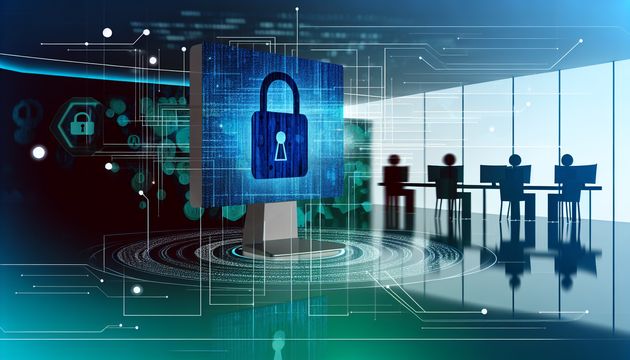
Cybersecurity Checklist for Startups in 2025
In the rapidly evolving digital landscape of 2025, startups face unprecedented cybersecurity challenges that demand immediate and strategic attention. As these nascent companies strive to innovate and disrupt traditional markets, they often become prime targets for cybercriminals due to their limited resources and high-value intellectual property. According to the National Cyber Security Alliance, a staggering 43% of cyberattacks target small businesses, including startups, with nearly 60% of these businesses closing within six months post-attack. This alarming statistic underscores the critical need for startups to embed robust cybersecurity measures from the outset (National Cyber Security Alliance).
The financial and reputational repercussions of cyberattacks can be devastating, with the average cost of a data breach reaching $4.45 million globally in 2023, as reported by IBM (IBM). Beyond financial losses, startups risk eroding the trust of customers, investors, and partners, which is vital for their survival and growth. Therefore, fostering a cybersecurity-first culture is not just a defensive strategy but a foundational business imperative. This involves integrating cybersecurity into the core values and operations of the business, supported by regular employee training and leadership commitment.
Moreover, the adoption of innovative and cost-effective cybersecurity solutions, such as open-source tools and managed security services, can help startups build a resilient security framework without straining their budgets. Compliance with regulations like GDPR and CCPA is also crucial to avoid legal penalties and protect customer data. As startups navigate these challenges, they must also consider cybersecurity insurance and partnerships with cybersecurity startups to access cutting-edge solutions tailored to their needs (Allied Market Research).
The Importance of Cybersecurity for Startups
Understanding the Unique Cybersecurity Challenges Faced by Startups
Startups face a unique set of cybersecurity challenges due to their limited resources, lack of robust security infrastructure, and the high value of their intellectual property. According to a report by the National Cyber Security Alliance, 43% of all cyberattacks target small businesses, including startups, and nearly 60% of these businesses shut down within six months of a cyberattack. This highlights the critical need for startups to prioritize cybersecurity from the outset.
Unlike established enterprises, startups often operate with minimal budgets, making it difficult to allocate funds for comprehensive cybersecurity measures. Additionally, the rapid pace of growth and adoption of cloud-based tools can create vulnerabilities that cybercriminals exploit. Startups must, therefore, adopt a proactive approach to cybersecurity by identifying and mitigating risks early in their lifecycle.
The Financial and Reputational Impact of Cyberattacks on Startups
Cyberattacks can have devastating financial and reputational consequences for startups. The financial costs include direct losses from data breaches, fines for non-compliance with regulations, and the expense of recovering compromised systems. For example, the average cost of a data breach globally was estimated at $4.45 million in 2023, as reported by IBM’s “Cost of a Data Breach Report” from July 2023.
Reputational damage is another significant concern. Startups rely heavily on building trust with customers, investors, and partners. A single cybersecurity incident can erode this trust, making it difficult for the business to recover. For instance, a breach involving customer data could lead to negative media coverage, loss of customers, and a decline in investor confidence.
Building a Cybersecurity-First Culture in Startups
Creating a cybersecurity-first culture is essential for startups to mitigate risks effectively. This involves integrating cybersecurity into the core values and daily operations of the business. Startups should provide regular training to employees on best practices, such as recognizing phishing attempts, using strong passwords, and securely handling sensitive data.
Leadership plays a crucial role in fostering this culture. Founders and executives must lead by example, demonstrating a commitment to cybersecurity by investing in necessary tools and resources. Additionally, startups can establish clear policies and protocols for handling cybersecurity incidents, ensuring that all employees understand their roles and responsibilities.
Leveraging Cost-Effective Cybersecurity Solutions
Startups often operate on tight budgets, but this does not mean they cannot implement effective cybersecurity measures. There are several cost-effective solutions available that can help startups protect their digital assets. For example:
- Open-Source Security Tools: Tools like ClamAV for antivirus protection and Snort for intrusion detection are free and widely used by startups.
- Cloud Security Services: Many cloud providers, such as AWS and Google Cloud, offer built-in security features like encryption and access controls at no additional cost.
- Managed Security Services: Outsourcing cybersecurity to managed service providers (MSPs) can be a cost-effective way to access expertise and advanced tools without hiring a full-time security team.
By leveraging these solutions, startups can build a robust cybersecurity framework without exceeding their budgets.
Compliance with Cybersecurity Regulations
Startups must comply with relevant cybersecurity regulations to avoid legal penalties and ensure the protection of customer data. Regulations such as the General Data Protection Regulation (GDPR) in Europe and the California Consumer Privacy Act (CCPA) in the United States impose strict requirements on data handling and breach reporting.
Non-compliance can result in significant fines and legal action. For example, under GDPR, companies can be fined up to €20 million or 4% of their global annual revenue, whichever is higher, for serious violations. Startups should familiarize themselves with these regulations and implement measures to ensure compliance, such as conducting regular audits and appointing a data protection officer (DPO) if necessary.
The Role of Cybersecurity Insurance for Startups
Cybersecurity insurance is an emerging solution that can help startups mitigate the financial impact of cyberattacks. These policies typically cover expenses related to data breaches, such as legal fees, notification costs, and business interruption losses. According to a recent report by Allied Market Research, the global cybersecurity insurance market is expected to grow significantly, reflecting the increasing demand for such coverage.
Startups should evaluate their risk profiles and consider investing in cybersecurity insurance as part of their overall risk management strategy. While insurance cannot prevent cyberattacks, it can provide financial support to help startups recover more quickly and effectively.
Partnering with Cybersecurity Startups for Innovative Solutions
Collaborating with cybersecurity startups can provide access to cutting-edge solutions tailored to the needs of small businesses. Many cybersecurity startups specialize in areas such as data protection, mobile security, and threat intelligence, offering innovative tools that address specific vulnerabilities.
For instance, companies like SentinelOne and CrowdStrike provide advanced endpoint protection solutions that leverage artificial intelligence (AI) to detect and respond to threats in real time. Startups can benefit from these technologies by partnering with cybersecurity providers or adopting their solutions.
Continuous Monitoring and Incident Response Planning
Continuous monitoring is a critical component of an effective cybersecurity strategy. Startups should implement tools and processes to monitor their networks, systems, and applications for signs of suspicious activity. This enables them to detect and respond to threats before they escalate into full-blown incidents.
In addition to monitoring, startups must have a well-defined incident response plan in place. This plan should outline the steps to be taken in the event of a cybersecurity incident, including containment, investigation, and recovery. Regularly testing and updating the plan ensures that the startup is prepared to handle incidents effectively.
Educating Customers and Building Trust
Startups can differentiate themselves by educating their customers about cybersecurity and demonstrating their commitment to protecting user data. This can be achieved through transparent communication, such as publishing privacy policies and providing updates on security measures.
Building trust with customers is essential for startups to establish long-term relationships and gain a competitive edge. By prioritizing cybersecurity and openly addressing customer concerns, startups can position themselves as reliable and trustworthy partners in an increasingly digital world.
Conclusion
By addressing these key areas, startups can build a strong cybersecurity foundation that protects their assets, ensures compliance, and fosters trust with stakeholders. While the challenges are significant, the solutions are within reach, enabling startups to thrive in a secure and resilient manner.
Cybersecurity Checklist for Startups in 2025
Implementing a Zero Trust Architecture
Startups in 2025 must adopt a Zero Trust Architecture (ZTA) to ensure robust cybersecurity. Unlike traditional security models that assume everything inside the network is trustworthy, ZTA operates on the principle of “never trust, always verify.” This approach requires continuous verification of user identities, devices, and access requests.
Key Components of ZTA:
- Identity Verification: Use multi-factor authentication (MFA) to ensure only authorized personnel access sensitive systems. For example, startups can integrate biometric authentication with password-based systems. (Veriff)
- Micro-Segmentation: Divide the network into smaller, isolated segments to limit the spread of potential breaches. Each segment should have its own security controls.
- Real-Time Monitoring: Employ AI-driven tools to monitor network activity and flag anomalies. AI systems can detect unusual patterns, such as unauthorized access attempts or data exfiltration. (VSecureLabs)
Prioritizing Employee Cybersecurity Training
Human error remains one of the leading causes of cybersecurity breaches. Startups must prioritize employee training to mitigate risks associated with phishing, social engineering, and other human-centric attacks.
Training Best Practices:
- Regular Phishing Simulations: Conduct monthly phishing simulations to test and improve employee awareness.
- Role-Based Training: Tailor training programs to specific roles. For instance, IT teams should receive advanced training on incident response, while non-technical staff should focus on identifying suspicious emails.
- Gamification: Use gamified training platforms to make learning engaging and effective. Studies show that gamification can increase retention rates by up to 40%. (ITSASAP)
Securing Remote Work Environments
With remote work becoming the norm, startups must secure remote endpoints and connections. The shift to remote work has increased the attack surface, making endpoint security a critical focus area.
Strategies for Securing Remote Work:
- Endpoint Detection and Response (EDR): Deploy EDR solutions to monitor and protect remote devices. These tools can identify and neutralize threats in real-time.
- Virtual Private Networks (VPNs): Use VPNs to encrypt data transmitted between remote workers and company servers. However, startups should consider transitioning to Zero Trust Network Access (ZTNA) for enhanced security. (Maddyness)
- Device Management Policies: Implement policies that mandate the use of company-approved devices with updated security patches.
Investing in Identity and Access Management (IAM)
Identity and Access Management (IAM) solutions are essential for controlling who has access to what within an organization. Startups should invest in modern IAM systems to enhance security and streamline user access.
Emerging IAM Trends:
- Decentralized Identities: Leverage blockchain technology to create decentralized identities, giving users more control over their personal data. (TechTarget)
- AI-Driven IAM: Use AI to automate identity verification and access control processes, reducing the risk of human error.
- Single Sign-On (SSO): Implement SSO to simplify access management while maintaining security. SSO allows users to access multiple systems with a single set of credentials.
Leveraging Cybersecurity Startups for Innovative Solutions
The cybersecurity landscape is evolving rapidly, and startups must stay ahead by leveraging innovative solutions from emerging cybersecurity companies. These startups offer cutting-edge technologies that address specific challenges faced by small businesses.
Notable Cybersecurity Startups:
- Cyware: Specializes in cyber-fusion platforms that integrate threat intelligence with incident response. (Cyber Magazine)
- Darktrace: Uses AI to detect and respond to cyber threats autonomously.
- Tessian: Focuses on preventing human-layer security breaches, such as phishing and data leaks.
Allocating Adequate Cybersecurity Budgets
Startups often operate on tight budgets, but skimping on cybersecurity can lead to catastrophic consequences. Founders must allocate sufficient resources to protect their digital assets.
Budget Allocation Tips:
- Prioritize Investments: Focus on high-impact areas such as endpoint security, IAM, and employee training.
- Leverage Open-Source Tools: Use open-source cybersecurity tools to reduce costs without compromising security.
- Plan for Incident Response: Allocate funds for incident response planning and testing to ensure quick recovery from potential breaches. (Maddyness)
Preparing for Cybersecurity IPO Requirements
For startups planning to go public, meeting cybersecurity IPO requirements is crucial. Investors and regulators expect robust cybersecurity measures to be in place.
Key IPO Requirements:
- Compliance with Regulations: Ensure compliance with data protection laws such as GDPR and CCPA.
- Third-Party Audits: Conduct regular third-party audits to validate the effectiveness of cybersecurity measures.
- Transparency: Provide detailed disclosures about cybersecurity risks and mitigation strategies in IPO filings. (Option3)
Emerging Trends in Cybersecurity for Startups
AI-Driven Threat Detection and Response
Startups in 2025 are increasingly leveraging artificial intelligence (AI) to enhance their cybersecurity strategies. AI-powered tools are being developed to detect threats in real-time, analyze vast amounts of data, and respond to incidents autonomously. These tools can identify patterns and anomalies that traditional systems might overlook, significantly reducing response times and mitigating potential damages. For instance, AI-augmented threat detection systems are expected to play a pivotal role in real-time threat mitigation, enabling startups to stay ahead of increasingly sophisticated cyberattacks.
Moreover, AI is being integrated into Security Operations Centers (SOCs), where it automates repetitive tasks and supports human analysts in decision-making processes. This integration allows startups to maintain robust security measures even with limited resources. The adoption of AI in cybersecurity is further accelerated by partnerships between established organizations and emerging AI startups.
Zero Trust Architecture Adoption
The adoption of Zero Trust Architecture (ZTA) is becoming a cornerstone of cybersecurity strategies for startups. This approach operates on the principle of “never trust, always verify,” ensuring that every access request is authenticated and authorized, regardless of its origin. Startups are implementing ZTA to protect their networks from both external and internal threats, particularly as remote work and hybrid models continue to expand.
ZTA frameworks include multi-factor authentication (MFA), endpoint security, and micro-segmentation, which collectively minimize the attack surface and limit the lateral movement of threats within a network. The emphasis on ZTA is expected to grow in 2025 as organizations prioritize securing their digital assets against evolving cyber threats.
Cybersecurity as a Service (CaaS)
With limited budgets and expertise, many startups are turning to Cybersecurity as a Service (CaaS) solutions to manage their security needs. CaaS providers offer scalable, cost-effective services that include threat monitoring, vulnerability assessments, and incident response. This model allows startups to access advanced cybersecurity tools and expertise without the need for significant upfront investments.
CaaS solutions are particularly beneficial for startups operating in industries with stringent compliance requirements, such as fintech and healthcare. By outsourcing their cybersecurity operations, startups can focus on their core business activities while ensuring robust protection against cyber threats.
Quantum-Resistant Encryption
As quantum computing technology advances, the need for quantum-resistant encryption is becoming more critical. Startups are beginning to adopt encryption algorithms designed to withstand the computational power of quantum computers, which could potentially break traditional encryption methods. This proactive approach ensures that sensitive data remains secure even as quantum computing capabilities evolve.
Organizations emphasize the importance of preparing for quantum threats by investing in quantum-resistant encryption technologies. Startups that implement these measures early will be better positioned to protect their intellectual property and customer data in the long term.
Cybersecurity Talent Development
The shortage of skilled cybersecurity professionals continues to be a challenge for startups. To address this issue, many startups are investing in talent development programs and leveraging automation to bridge the skills gap. Initiatives such as cybersecurity bootcamps, certifications, and partnerships with educational institutions are helping startups build a pipeline of qualified professionals.
Additionally, startups are adopting AI-driven tools to automate routine security tasks, allowing their limited workforce to focus on more complex challenges. This trend highlights the growing role of AI in addressing the cybersecurity skills shortage.
Decentralized Identity and Authentication
Decentralized identity solutions are gaining traction as startups seek to enhance user authentication and data privacy. These solutions leverage blockchain technology to enable secure, user-controlled identity verification without relying on centralized databases. By decentralizing identity management, startups can reduce the risk of data breaches and provide users with greater control over their personal information.
The adoption of decentralized identity systems is particularly relevant for startups operating in sectors such as e-commerce and fintech, where secure and seamless user experiences are paramount. Decentralized technologies are among the key trends shaping the startup ecosystem in 2025.
Cybersecurity for IoT Devices
The proliferation of Internet of Things (IoT) devices presents unique cybersecurity challenges for startups. These devices often have limited processing power and security features, making them vulnerable to attacks. Startups are addressing these challenges by implementing IoT-specific security measures, such as device authentication, secure firmware updates, and network segmentation.
Startups must prioritize securing their IoT ecosystems to prevent unauthorized access and data breaches. The integration of AI and machine learning into IoT security solutions further enhances their ability to detect and respond to threats in real-time.
Regulatory Compliance and Data Privacy
Compliance with data protection regulations, such as the General Data Protection Regulation (GDPR) and the California Consumer Privacy Act (CCPA), is a top priority for startups in 2025. Non-compliance can result in significant fines and reputational damage, making it essential for startups to implement robust data privacy measures.
Startups are adopting privacy-by-design principles, conducting regular compliance audits, and investing in data encryption and anonymization technologies. The emphasis on regulatory compliance highlights the growing importance of adhering to data protection laws in an increasingly connected world.
Cybersecurity Awareness and Training
Human error remains one of the leading causes of cybersecurity incidents. To mitigate this risk, startups are investing in cybersecurity awareness and training programs for their employees. These programs focus on educating staff about phishing attacks, password hygiene, and safe online practices.
Interactive training methods, such as simulations and gamification, are being used to engage employees and reinforce key concepts. Creating a “human firewall” through employee training is a critical component of a comprehensive cybersecurity strategy.
Emerging Cybersecurity Startups to Watch
The cybersecurity landscape is constantly evolving, with new startups emerging to address specific challenges. Companies such as Cybereason, SentinelOne, and Aqua Security are developing innovative solutions to combat cyber threats. These startups are leveraging AI, machine learning, and other advanced technologies to provide cutting-edge security services.
The United States is home to a vibrant ecosystem of cybersecurity startups that are poised to make a significant impact in 2025. Startups in this space are focusing on areas such as threat intelligence, endpoint security, and cloud security, offering tailored solutions to meet the needs of their clients.
Conclusion
As we look towards 2025, the cybersecurity landscape for startups is marked by both challenges and opportunities. The adoption of Zero Trust Architecture (ZTA) and AI-driven threat detection are becoming essential components of a robust cybersecurity strategy. These technologies not only enhance security but also align with the evolving needs of remote work environments and decentralized identity management (Veriff, VSecureLabs).
Startups must prioritize cybersecurity training to mitigate human error, which remains a leading cause of breaches. By investing in employee education and leveraging gamified training platforms, startups can significantly enhance their security posture. Additionally, the shift towards Cybersecurity as a Service (CaaS) offers scalable and cost-effective solutions that allow startups to focus on their core business activities while ensuring comprehensive protection against cyber threats (ITSASAP).
Emerging trends such as quantum-resistant encryption and the integration of AI in Security Operations Centers (SOCs) highlight the need for startups to stay ahead of technological advancements. By preparing for quantum threats and addressing the cybersecurity skills shortage through talent development programs, startups can safeguard their digital assets and maintain a competitive edge.
Ultimately, the path to cybersecurity resilience for startups involves a multifaceted approach that includes strategic investments, regulatory compliance, and continuous innovation. By embracing these strategies, startups can not only protect themselves from cyber threats but also build trust with stakeholders, paving the way for sustainable growth and success in the digital age (TechTarget, Maddyness).
References
- National Cyber Security Alliance, 2023, https://staysafeonline.org
- IBM, 2023, https://www.ibm.com/security/data-breach
- Allied Market Research, 2023, https://www.alliedmarketresearch.com
- Veriff, 2024, https://www.veriff.com
- VSecureLabs, 2024, https://vsecurelabs.co
- ITSASAP, 2024, https://www.itsasap.com
- TechTarget, 2024, https://www.techtarget.com
- Maddyness, 2024, https://www.maddyness.com



